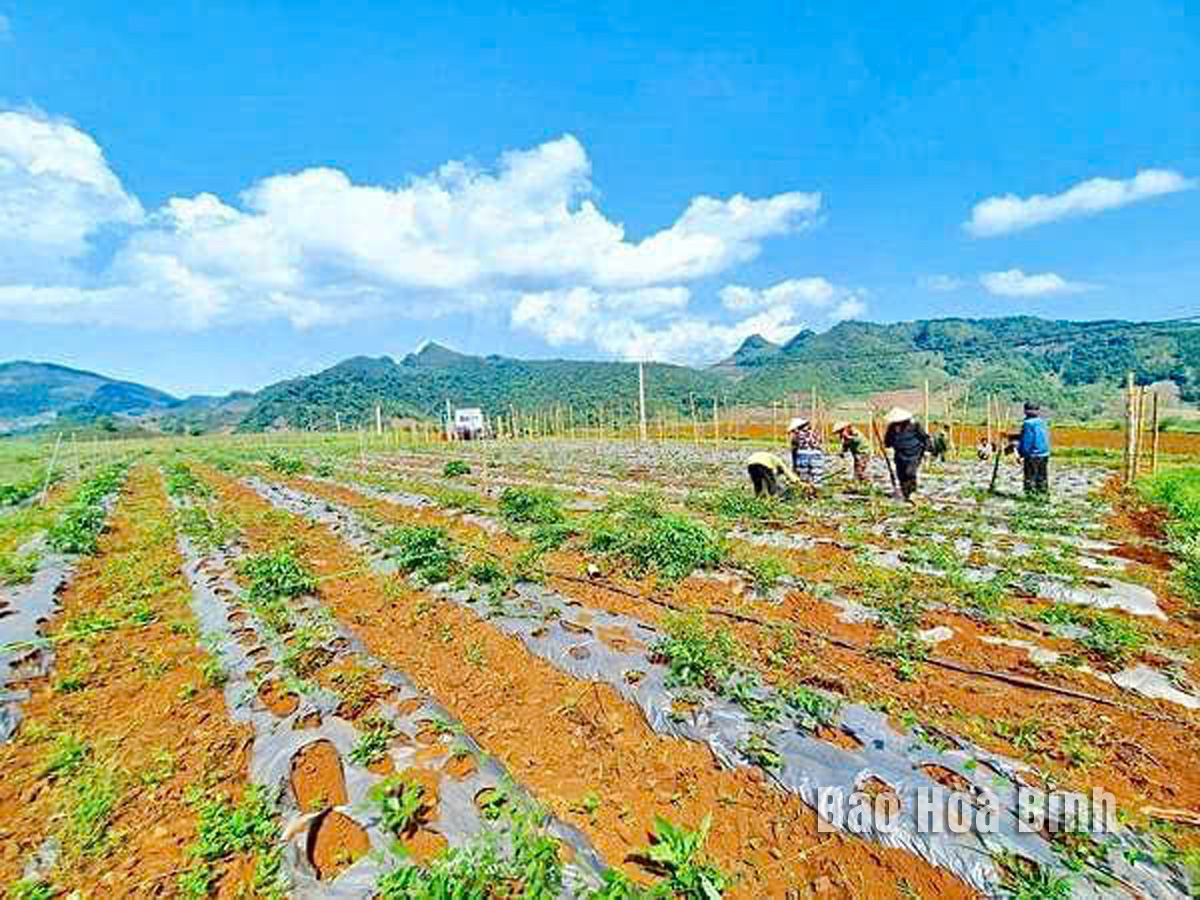
Replacing less productive crops with herbal medicines has proven to be an effective direction for many localities in Hoa Binh province.
In 2018, the Big Farm herbal cooperative leased 10 ha of mixed garden land from farmers in Men village, Yen Hoa commune (Da Bac district) to start growing several types of herbal plants.
Yen Tri commune in Yen Thuy district is one of the "bright spots" in herbal medicine development. Chairman of the communal People’s Committee Bui Phi Diep said that when embarking on the new-style rural area building scheme, the first challenge for the local authorities was how to increase the income for local residents. He added that the orientation of switching to herbal medicine cultivation on areas of less productive crops and mixed gardens aimed for this goal.
To achieve the highest effectiveness, the local authority selected high-value herbal plants and precious indigenous medicinal plants, and encourages residents to cultivate these as replacements. At the same time, it has proposed the district collaborate with herbal medicine centres and pharmaceutical companies to develop a production linkage model.
Cultivating medicinal plants generates economic value approximately three times higher than rice cultivation, helping to improve the incomes of many households in Yen Tri. The area dedicated to herbal plant cultivation in the commune has expanded to about 35 ha, attracting 45 households in the Yen Tri Agricultural Cooperative, and 100 other households to join.
Besides Yen Tri, the cultivation and development of medicinal plants have been implemented in many localities. So far, Hoa Binh has approximately 2,350 ha of medicinal plants, including 197.6 ha where the plants are intercropped on forest land.
Some of the main medicinal plants including lemongrass, solanum procumbens, and celastrus hindsii, with yearly average outputs of 11,000 tonnes, 1,200 tonnes and 1,620 tonnes, respectively. Additionally, there are various naturally harvested medicinal plants, such as cordyceps, passionflower, Paris polyphylla smith, and anoectochilus.
In recent years, the provincial authorities have issued many mechanisms and policies to encourage investment in planting and processing of medicinal plants. Projects and socio-economic development programmes in ethnic minority and mountainous areas and the "One Commune, One Product" programme have helped promote and encourage economic sectors to invest in the cultivation and and processing of medicinal plants.
Currently, the province has 13 facilities and enterprises engaged in the purchasing and preliminary processing of medicinal plants, along with 10 small-scale processing establishments run by enterprises and households. These efforts have initially created stable outlets for medicinal plants in the province.
According to the leadership of the provincial Department of Agriculture and Rural Development, in the coming time, based on natural conditions, market demand, economic value, and export potential, the locality will develop a list of prioritised medicinal plants for development. Additionally, it will establish mechanisms, policies, and support plans for the cultivation, development, and harvesting of medicinal plants in special-use forests, protective forests, and production forests; as well as renting land for medicinal plant development; in line with forest management regulations and the provisions of the Land Law in 2024.
Once a mountainous province facing many challenges, Hoa Binh has, after more than a decade of implementing the national target programme on new-style rural area development, emerged as a bright spot in Vietnam’s northern midland and mountainous region. In the first quarter of 2025, the province recorded positive results, paving the way for Hoa Binh to enter a phase of accelerated growth with a proactive and confident mindset.
Hoa Binh province is steadily advancing its agricultural sector through the adoption of high-tech solutions, seen as a sustainable path for long-term development.
The steering committee for key projects of Hoa Binh province convened on May 14 to assess the progress of major ongoing developments
A delegation of Hoa Binh province has attended the "Meet Korea 2025" event, recently held by the Ministry of Foreign Affairs, the Embassy of the Republic of Korea (RoK) in Vietnam, the Korea Trade-Investment Promotion Agency, and the People's Committee of Hung Yen province.
Hoa Binh province joined Vietnam’s national "One Commune, One Product” (OCOP) programme in 2019, not simply as a mountainous region following central policy, but with a clear vision to revive the cultural and agricultural values in its villages and crops.
From just 16 certified products in its inaugural year to 158 by early 2025, the One Commune One Product (OCOP) programme in Hoa Binh province has followed a steady and strategic path. But beyond the numbers, it has reawakened local heritage, turning oranges, bamboo shoots, brocade, and herbal remedies into branded, market-ready goods - and, more profoundly, transformed how local communities value and present their own cultural identity.



